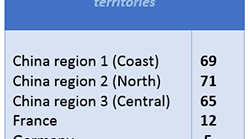The index reflects data related to economics, natural hazards and supply chains, and addresses deep concerns about business risks such as cyber attacks, political upheaval, fire and hurricanes. Resilience, the flipside of risk, means resisting business disruption and rebounding quickly if it occurs.
For global business leaders, cyber attacks raise the specter of stalled operations, disrupted supply chains, class-action lawsuits and permanent brand damage. France fell 33 places in the cyber resilience dimension of this year’s index from 68th to 101st of 130 regions. The drop reflects a deterioration in civil liberties within the country rating and a slight uptick in the country’s internet penetration, according to FM Global. Internet penetration reportedly explains Australia’s nine-place fall in cyber resilience. The country and continent dropped from 66th to 75th of the 130 regions ranked in the Index, driven by a 3% increase in internet penetration. Taiwan’s cyber resilience, on the other hand, soared 57 places from 107th to 50th, the biggest rise in the index, due in large part to an increase in its civil liberties.
The United States (all three of its regions) saw its rank in political resilience drop over the last year from 31st to 46th. The fall likely reflects a turbulent diplomatic climate intensified by North Korea’s nuclear threat and signs of Russian election meddling. The political risk driver of the index draws on data from the World Bank and represents “perceptions of the likelihood that the government will be destabilized or overthrown by unconstitutional or violent means, including politically motivated violence and terrorism.” Despite a fraught political climate, the United States remains a country with a resilient environment for business with its regions coming in 9th, 10th and 15th on the overall ranking—or the top 12% of all countries ranked.
Fire remains the leading cause of property damage worldwide. The Grenfell Tower fire in the United Kingdom (U.K.) was a particularly stark reminder of fire’s threat to life and property. Blamed on highly combustible materials and a lack of sprinklers, that disaster claimed 71 lives last June. The index suggests that the U.K. has room for improvement in fire risk management. Though it ranks 18th overall for its resilience to business disruption, the U.K. remains at 34th in fire risk quality. Fire risk quality takes into account the quality and enforcement of a country’s building codes, along with a measure of the fire risk quality of actual facilities visited by FM Global’s property risk engineers.
Natural hazards are another concern for business executives as demonstrated by 2017’s Atlantic hurricane season, the most expensive on record. Hurricanes Harvey, Irma and Maria claimed hundreds of lives, cost an estimated US$265 billion and caught many executives less than fully prepared. For companies with key facilities in regions exposed to such devastation, the lesson is clear, according to FM Global: Build resilience through targeted investment in prevention and recovery programs. Geographies in the index with significant natural hazard exposure include China Region 1 (ranked 69th), the Philippines (88th), Japan (24th), Mexico (62nd) and U.S. Region 1 (ranked 10th).
Switzerland again holds the top spot in overall resilience in the index, followed by Luxembourg and Sweden—all the same as last year. Haiti is the bottom-ranked country followed by Venezuela and Nepal—also the same order as last year.
For more information, visit: www.fmglobal.com

